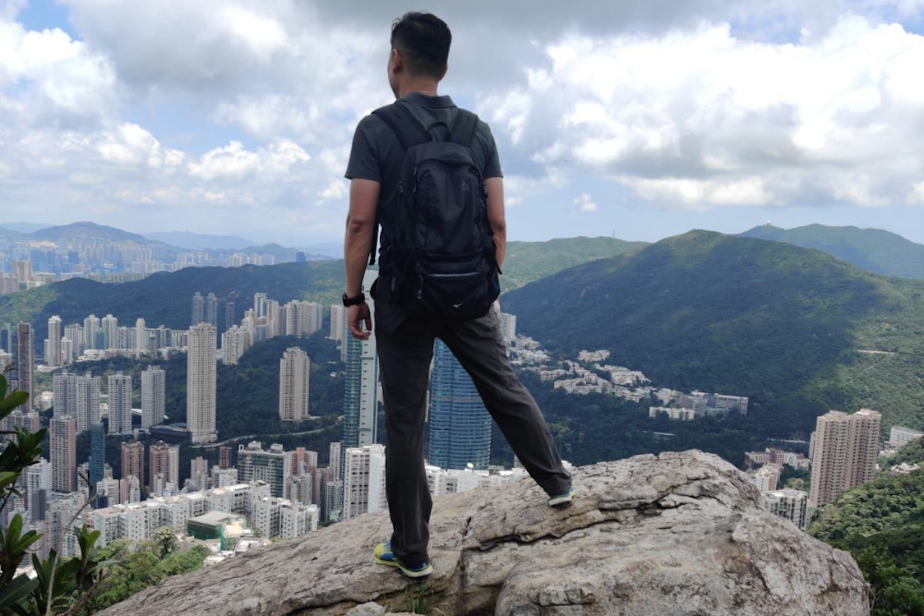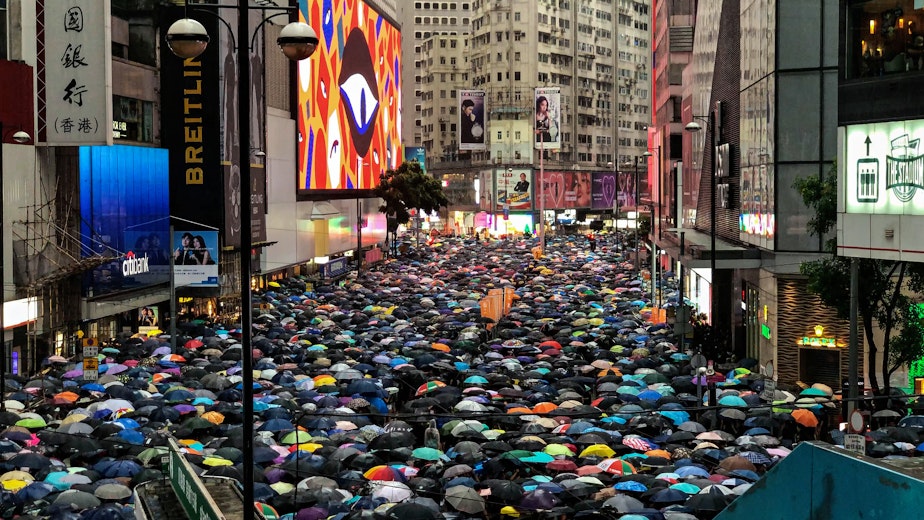'It was like a typhoon striking': How Hong Kong's attitude toward protests has changed

In 2019, the streets of Hong Kong were filled with tear gas and umbrellas. But how did they get to that point, and what’s happening now?
RadioActive’s Lucas Deng wanted to learn more about how protests have changed in Hong Kong over time. So he spoke with a family friend, Mr. Woo, who has lived in Hong Kong for most of his life.
[RadioActive Youth Media is KUOW's radio journalism and audio storytelling program for young people. This story was entirely youth-produced, from the writing to the audio editing.]
I
f I asked you to close your eyes and picture protests in Hong Kong, you might think about umbrellas.
Umbrellas have been a symbol of protest in Hong Kong since 2014, when pro-democracy protesters used umbrellas to protect themselves from police tear gas.

Sponsored
I wanted to learn more about how protests have changed in Hong Kong over time. So I talked to Mr. Woo, a family friend who has lived in Hong Kong for most of his life. He agreed to speak to RadioActive on the condition that his first name wouldn't be published, citing concerns for his security.
Mr. Woo moved to Hong Kong when he was in middle school.
"When I first came in 1989, Hong Kong was still a British colony," Mr. Woo said. "But our school was pretty pro-China. We would already raise the Chinese flag and sing the [Chinese] national anthem."
In June 1989, the same year Mr. Woo moved to Hong Kong, something else was going on in the region. In China, student-led, peaceful, pro-democracy protests were fired on by the military and police in what is now known as the Tiananmen Square massacre.
Sponsored
"When [the Tiananmen Square massacre] happened, even though I was just a seventh grader, the school would encourage us to go out and to join the protests to express Hong Kong's demands after what happened [there]," Mr. Woo said.
Mr. Woo says at the time, it was much safer for Hong Kongers to speak out.
"Back then, society was very progressive, you could have different opinions,” he said.
In 1997, Britain returned control of Hong Kong to China. Hong Kong became a “special administrative region” of China, and, under the “one country, two systems” principle, China promised Hong Kong a lot of autonomy.
But in the past decade, things have changed.
Sponsored
In 2014, China’s government limited who Hong Kongers could vote for in elections. Add to that the global Occupy movement that was happening at the time, and what resulted were three months of protests that filled Hong Kong’s business district. The protests eventually fizzled out, with no concessions from Beijing.
Then, in 2019, protests were sparked again, this time by an extradition bill that would allow people convicted of crimes in Hong Kong to be sent to mainland China to face trial. To many, this was a direct breach of the autonomy promised to Hong Kong and allowed China to silence political dissidents.
More than one million Hong Kongers gathered to protest the bill, and clashes between police and protestors were violent — police use of tear gas increased significantly over 2014, with more than 3,000 rounds fired.
I asked Mr. Woo on how the 2019 protests affected life in Hong Kong.
Sponsored
"It was like a typhoon suddenly striking and destroying everything, everything in an instant. Just like that," Mr. Woo said. “In my understanding, a healthy government, when they see this much civil unrest over a bill or a law, they postpone or even cancel that bill, because they would consider the public's reaction. But at that time, they kept ignoring the problem and pushing through with the bill.”
Mr. Woo says that these days, protesting against the government can be dangerous.
"I don't know how foreigners see Hong Kong, but from an insider perspective, right now a lot of people have grievances with the government, but nobody will go out and say anything," Mr. Woo said.
Mr. Woo said there’s no environment for protest in Hong Kong anymore. People are afraid they’ll be convicted under new laws that make it easier to arrest protesters.
Sponsored
This year, for my piano recital, I played "Glory to Hong Kong," the unofficial anthem of Hong Kong.
My mom is from Guangdong, which is near Hong Kong. During the 2019 protests, she told me about what was going on. She told me about youth protesters taking massive risks to challenge the government. She said it was called the Revolution of Our Time, because many youth — people my age — are risking so much to rise up for democracy. And it’s more than just the youth — it’s people of all ages in Hong Kong and across the world.
I thought that these people were really brave. And I thought that if I could do anything to help — like telling this story — then I should.
This story was produced in a RadioActive Youth Media one-week Intro to Radio Storytelling workshop for high school-age youth. Production assistance by Merk Nguyen and Lucas Galarneau. Prepared for the web by Alayna Ly. Special thanks to Lisa Wang and Jimmy Chong for editorial support.
Find RadioActive on Instagram, Twitter, TikTok, YouTube and Facebook, and on the RadioActive podcast.
Support for KUOW's RadioActive comes from the Bill & Melinda Gates Foundation Discovery Center and BECU.



